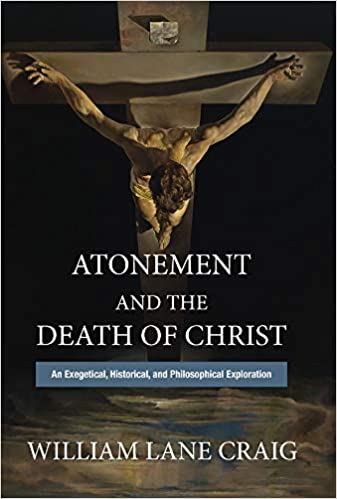It’s been a long, long time since I’ve read a good book on the atonement. The last one that I found really stimulating and challenging was Jurgen Moltmann’s The Crucified God, and it came out 40 some years ago! As it turns out, my old friend Bill Craig the polymath philosopher and apologete has now provided a very readable book that is well-researched and well-argued throughout. It’s the best current book I know of on this subject. I’ll be recommending it to anyone who will listen. One of the things that makes this book distinctive is that Bill ably deals first with the exegesis, then with the history of interpretation, then with the philosophical and logical aspects of the doctrine of atonement. Not many scholars could juggle all three of those balls without one of them falling on their heads. Bill seems to manage it with ease, though of course his forte is his own field of philosophy, so it is no surprise that the longest single portion of the book is the last portion on the philosophical aspects of things.
The essence of the book’s argument can be summed up as follows— penal substitutionary atonement, involving both propitiation of God’s wrath, and expiation of our guilt is at the very heart of the NT doctrine of the atonement. I completely agree with this analysis. Any theory of the atonement must adequately deal with the righteous character of God and the fact that his moral character demands that justice in some form must be done in a world where all have sinned, but at the same time since God is love, and is merciful, he found a way to satisfy the demands for justice and at the same time save the sinner.
Bill also tends to favor the theory of imputation that Erasmus first came up with (it’s really not found before him, and the Reformers then pick up that ball and run with it down the field) in which our sin is imputed to Christ and his righteousness to us. I demur on this last notion. I don’t find it in the NT frankly, and indeed the word ‘impute’ is never uttered by Paul or others. There are better ways to understand justification and also what happens at conversion. We are granted right standing with God based on the saving work of Christ for us. But at the very same time we are born of God, so that both our position and our condition change as a result of Christ’s passion. What is not the case is that Jesus is righteous for us. To the contrary he is busy making us righteous through the new birth and sanctification. We don’t need the legal fiction notion to make sense of what is said about these things in the NT.
Another important feature of this book is that Bill is a strong advocate not only for the universal scope of the atonement that Christ made on the cross, he’s also clear enough that God has not destined in advance only some to be saved. God desires the salvation of all, but human beings are free to reject that offer. God doesn’t make us an offer we can’t refuse….. for the Biblical God is not the Godfather. And I would add that the chief reason for this is because God is love, and he wants us to freely respond to his love. Love, after all cannot be manipulated or predetermined or coerced or forced, even unknowingly. Our positive faith response is of course not possible without God’s grace, but that grace is not irresistible.
Another very helpful feature of this book is that Bill reviews all the major classic theories of the atonement and their strengths and weaknesses. He educates us on some of the classic treatments we may not be familiar with, such as that of Socinus or Hugo Grotius. The only major contemporary dialogue partner who has written a book on Atonement who comes in for regular critique in this book is Elenore Stump. And in my view his critique is right on target. In the dialogue that follows in subsequent blog posts you will see some vigorous discussion on various points, but I find Bill’s basic case to be compelling. This is one of those books that I would say— sell some of your older books and buy this one. It’s definitely













